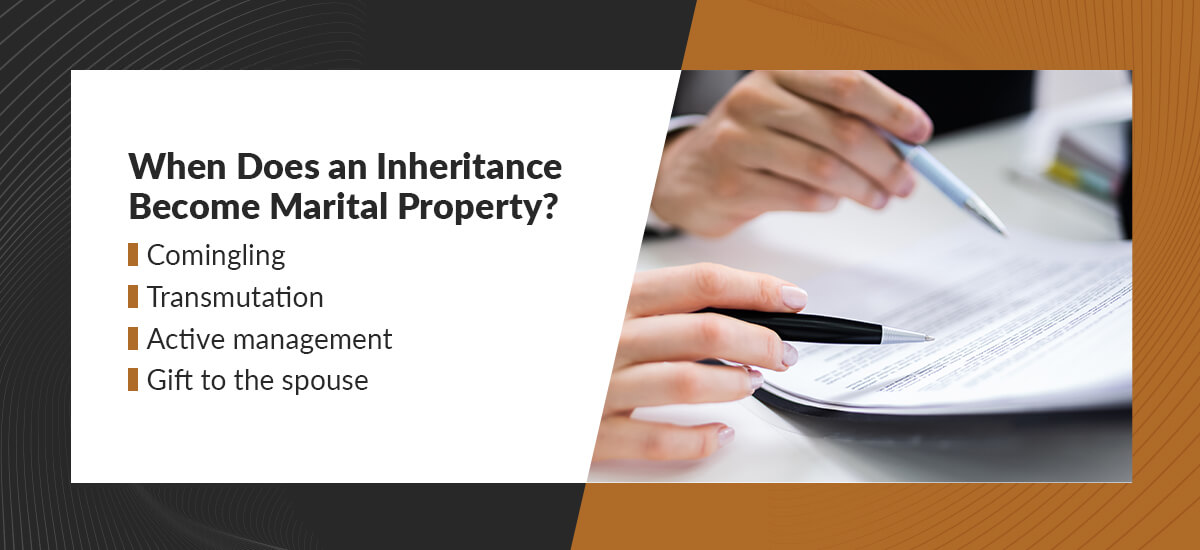Divorce can be a complicated and emotional process, especially when it comes to dividing assets and property. One aspect of divorce that can be particularly tricky to navigate is the division of inheritance money.
Inheritance money is often considered separate property and not subject to division during a divorce settlement. However, there are exceptions to this rule, and the way inheritance money is handled can vary depending on the circumstances of the divorce.
Is My Spouse Entitled to a Piece of My Inheritance in a Divorce?
The answer to this question depends on a few different factors, including the laws of your state and the specific circumstances of your divorce. In general, however, inheritance money is often considered separate property and is typically not subject to division during a divorce settlement.
Separate property is property that is owned by one spouse and not considered marital property, which is property acquired during the marriage. Inheritance money is typically considered separate property, as it is inherited by one spouse and not acquired during the marriage. However, there are some exceptions to this rule.
Ultimately, the best way to protect your inheritance in the event of a divorce is to keep it separate from marital property and assets. This can include keeping the inheritance money in a separate account or using it to purchase assets that are solely in your name. You may want to consult with a family law attorney who can provide guidance and advice based on the laws in your state and the specific circumstances of your divorce.
Does Inheritance Money Get Split in a Divorce?
The way inheritance money is handled can vary depending on the specific circumstances of the divorce.
For example, if you have comingled your inheritance money with marital funds or used the money to purchase joint assets, such as a home or investments, then it may be subject to division in a divorce settlement. Additionally, if you have used your inheritance money to support your household or pay for marital expenses, then it may be marital property and could be subject to division during a divorce.
It’s important to note that the laws regarding the division of property in divorce vary by state, and the specifics of your case may also impact how inheritance money is treated. It is recommended that you speak with a family law attorney who can provide guidance and advice based on the laws in your state and the specific circumstances of your divorce.

When Does an Inheritance Become Marital Property?
In some cases, an inheritance may become marital property and subject to division in a divorce. Here are some situations where an inheritance may be considered marital property:
- Comingling: If you inherit money and then deposit it into a joint account with your spouse or use it to pay for joint expenses, then the inheritance money could become commingled with marital assets and lose its separate property status.
- Transmutation: In some states, if you use inheritance money to purchase joint property, such as a home, the inheritance money could be considered a gift to the marital estate and become marital property.
- Active management: If you actively manage an inherited asset during your marriage, such as a rental property, and your spouse contributes to its maintenance and upkeep, then a portion of the inheritance may be considered marital property.
- Gift to the spouse: If you give your spouse a portion of your inheritance money as a gift, then that portion may become marital property.
Can You Claim an Ex-Spouse’s Inheritance Received After a Divorce?
It would depend on the specific laws and circumstances in your jurisdiction. In many cases, once a divorce is finalized, any property or assets received by one spouse through inheritance would typically be considered their separate property and would not be subject to division between the former spouses. However, it’s always best to consult with a legal professional familiar with the laws in your area to get a more accurate and specific answer to your question.
Prenuptial Agreements and Inheritance
Prenuptial agreements can be used to protect inheritance money and assets in the event of a divorce. A prenuptial agreement is a legal contract between two people who are planning to marry, and it typically outlines the way assets and debts will be divided in a divorce or separation.
In a prenuptial agreement, you can specify that your inheritance money will remain separate property and will not be subject to division in a divorce settlement. Additionally, you can outline how other assets, such as real estate or investments, will be divided during a divorce. Prenuptial agreements may also address other issues, including spousal support and the division of debts.
It’s important to note that prenuptial agreements are subject to state laws and must be entered into voluntarily and with full disclosure of all assets and debts. It’s also essential to have the agreement reviewed by a qualified attorney to ensure that it is valid and enforceable.
Overall, a prenuptial agreement can be a useful tool for protecting inheritance money and other assets in the event of a divorce. However, it’s important to carefully consider the terms of the agreement and work with an attorney to ensure that it meets your needs and is legally enforceable.
Get a Cash Advance on Your Inheritance From Inheritance Funding Company
At Inheritance Funding Company, we offer cash advances to heirs who are entitled to an inheritance but have not yet received it. We provide an advance on the expected inheritance amount, which is repaid once the inheritance is received.
To obtain a cash advance on your inheritance, you will need to provide information about the estate and your expected inheritance, as well as any relevant documentation, such as a will or probate order. If you are approved for a cash advance, we will provide you with a lump sum payment, which can be used for any purpose. The amount of the advance will depend on the expected inheritance amount and other factors, such as the time frame for distribution and the risk involved.
If you have concerns about divorce and inheritance, contact us today to learn more or to apply for an advance on your inheritance.


